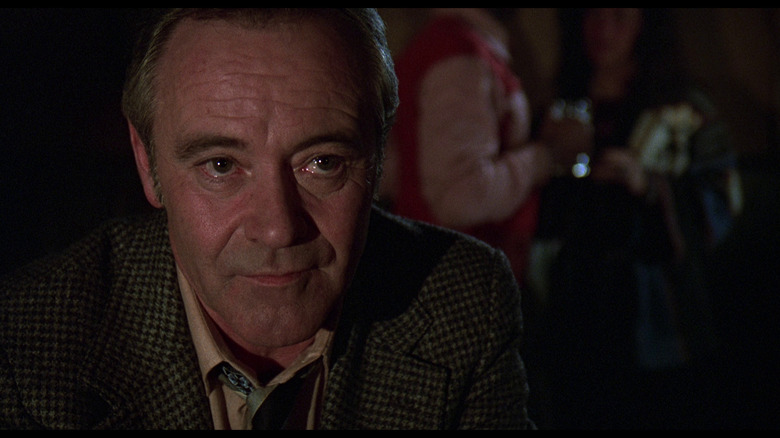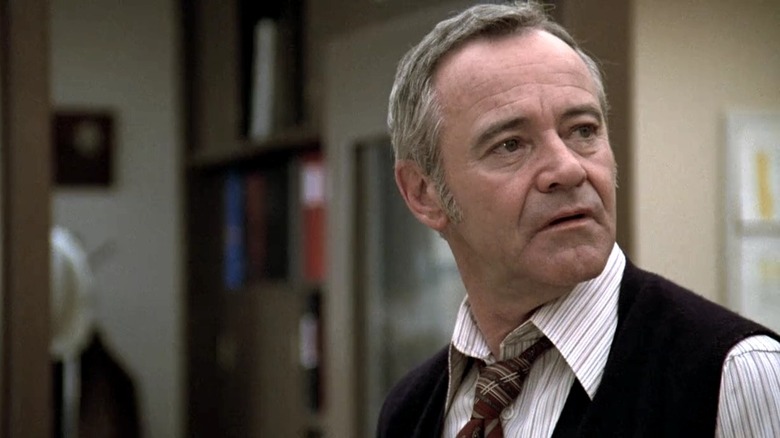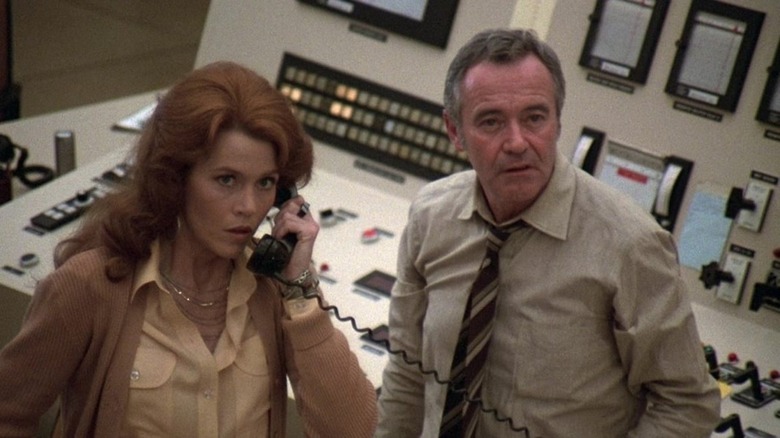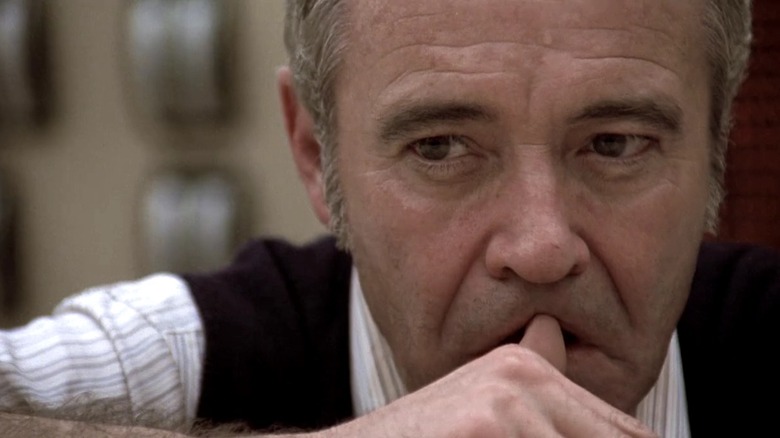Jack Lemmon Went 'Out On A Limb' By Starring In China Syndrome
For actors, the biz of showbiz involves selling yourself to both the public and the industry at the same time. Packaging your persona and your talent as a "brand" or "type" can lead to the dreaded type-casting problem, of course. Yet it's a necessary evil, a way to get the job by proving you can already do the job.
Throughout his career, Jack Lemmon became known as a consummate comic actor: an affable, lovable everyman who had impeccable timing and was a master of character-based humor, picking up the baton from folks like Cary Grant and Bob Hope and paving the way for people like Gene Wilder and Ben Stiller. His association with director Billy Wilder resulted in comedy masterpieces such as "Some Like It Hot" and "The Apartment," and together with Walter Matthau he made the definitive version of "The Odd Couple."
Yet Lemmon would also, on occasion, demonstrate his massive range, twisting his persona into some darker places with decidedly non-comedic material. One of his triumphs in this vein is his turn as nuclear power plant supervisor Jack Godell in director James Bridges' 1979 thriller "The China Syndrome." A company man turned whistleblower isn't the most obvious role for Lemmon, and he knew it — in fact, Lemmon was so adamant that he play the part that he campaigned for it, convincing producer and co-star Michael Douglas and turning down other roles while waiting for the movie to go forward.
Lemmon convinced the producer on his vision
"The China Syndrome" is a movie in the conspiracy thriller subgenre, concerning a nuclear power plant in southern California that, thanks to shoddy business practices by its owners, is veering dangerously close to meltdown. Upon discovering the plant's flaws, Jack Lemmon's Jack Godell agrees to blow the whistle via TV news journalist Kimberly Wells (Jane Fonda), at which point he's intimidated by his superiors as well as followed and menaced by mysterious people.
Other conspiracy thrillers made prior to "The China Syndrome" featured young male leads, with the most prominent example being Robert Redford, star of "Three Days of the Condor" and "All the President's Men." The creative team was looking for a similar type to play Godell, but when Lemmon came across the script for the film, the actor concocted a pitch for his playing the part instead. As Lemmon recounted to Chet Cooper in 2010:
"I finally had to make the decision, 'Do I want to play this part or not?' And, there were times I would take a chance and go out on a limb, and it's worked out. 'China Syndrome' is a good example of that. The part originally was written for a hotshot engineer in his 30s. I guess I was 50 or 60-something then. Michael Douglas was the producer ... So, we went to Michael and said 'Listen, (suppose) the guy was a little older and had spent his whole life completely wrapped up in nuclear energy, and then he has to cut the umbilical cord. It's not very easy, you know ...The older he is, the more sympathetic the character becomes and the more we understand his problems and his horror about the whole thing.' And, Michael bought it and said, 'OK, you've got it.'"
Jack Lemmon helped get Jane Fonda cast
Jack Lemmon was so taken with the script, written by James Bridges with co-writers Mike Gray and T.S. Cook, that he stuck with the project even as Michael Douglas looked for the financing and the greenlight, sacrificing jobs in the process. As he recalled to Ability Magazine, "I was with it from the very beginning and I kept turning everything down waiting for this to go and waiting for this to go ... and waiting and waiting."
Fortunately, Douglas had been totally convinced of Lemmon's involvement. "Michael was wonderful," Lemmon continued. "He'd call me up every month or so and say, 'this is what's going on, etc.'" After the film was finally set up at Columbia — "where I'd been under contract when I first came up," Lemmon added — it turned out that Jane Fonda had been signed to do another movie at the studio which fell through. The filmmakers then got the idea to tap Fonda for the lead, a notion Douglas ran by his other star. As Lemmon recalled:
"So Jane was just sitting there without a project and Michael or somebody suddenly said, 'Wait a minute. This part of the newsman' — which was written for a man — 'How about Jane play it and we make it a woman?' And Michael called me up and said, 'What do you think about that?' and I said, 'I think it's terrific. You've got a leading lady now.' I just think that ... making one of your lead characters be a woman who is trying to get along in a man's world — because at that time there were very few ladies that were news (reporters) — finally got us off the ground. Once we had Jane and me, we were all set."
'That thing raised hell'
With the casting of Jack Lemmon and Jane Fonda in the leads, "The China Syndrome" became a movie that was even more progressive than it initially was, advocating not just for nuclear safety but leading roles for older men and women. When it came to criticizing the nuclear power industry, the movie overperformed, thanks in part to the real-life Three Mile Island tragedy taking place roughly a week after the film went into general release. As Lemmon recalled:
"Yeah, that thing raised hell, especially in that Three Mile Island happened just after the film was released. People jokingly were coming up to me and saying, 'How much did it cost you to blow that thing up?'"
For his part, Lemmon's performance proved once again that the actor could access a wealth of emotions and shades to his persona. During his climactic monologue in the movie, Lemmon adapts his natural rhythms to toe the line between making Jack Godell seem unbalanced as well as righteous, the scene recalling Jimmy Stewart or Peter Finch at their most intense.
Even though Lemmon had already twisted his persona in films like "Days of Wine and Roses," his performance in "The China Syndrome" proved beyond a doubt that he was as strong at drama as he was at comedy. His work in the film led to being nominated for an Academy Award (not to mention winning a BAFTA for Best Actor), and his strength in the role echoed through the rest of his career, especially during his leading turn as Shelley in 1992's "Glengarry Glen Ross." When talented actors go out on a limb, the results are often rewarding and thrilling, and Jack Lemmon's work in "The China Syndrome" only serves to prove that to be true.



